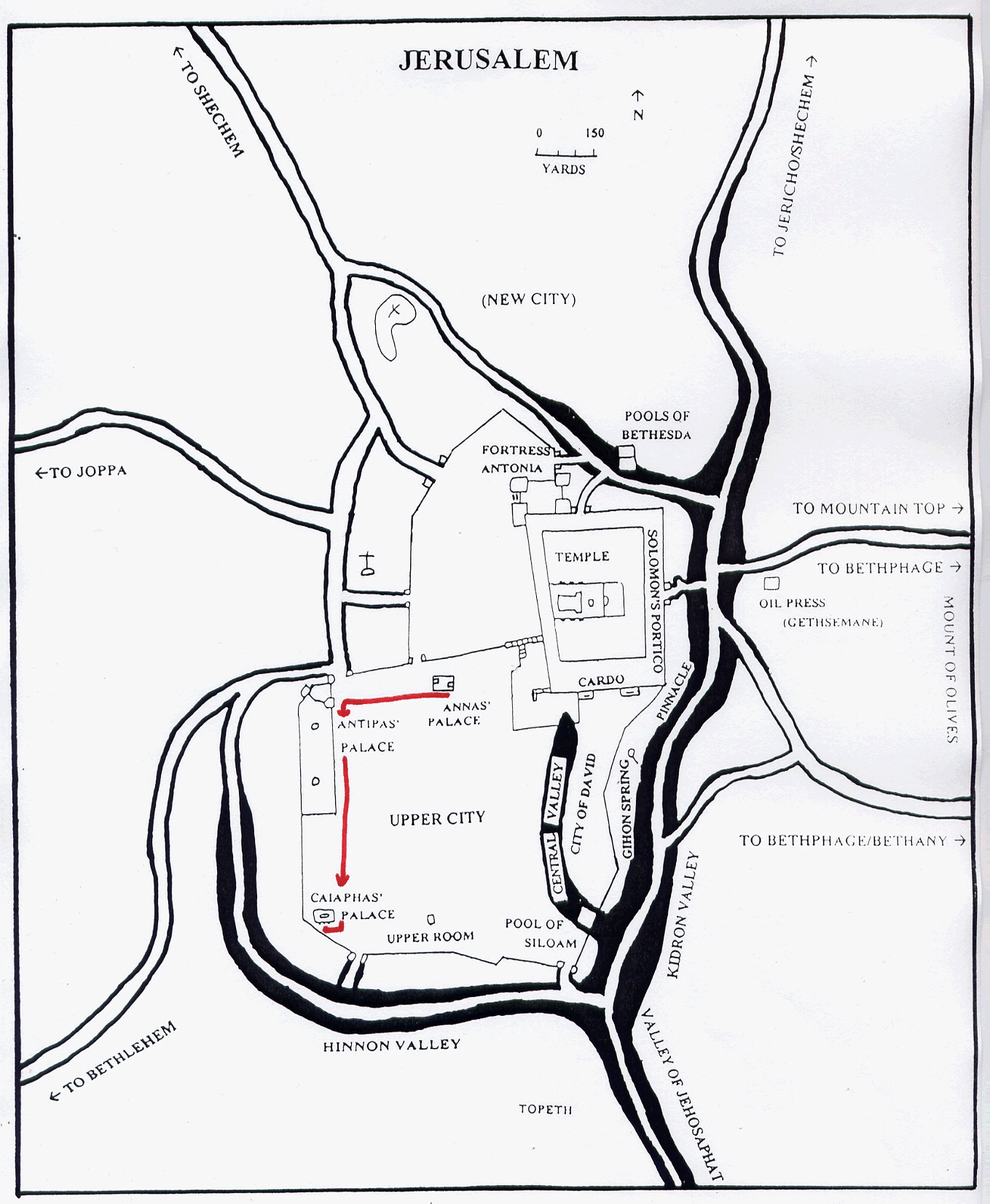78 – Caiaphas Questions Jesus
Where: Palace of Caiaphas, Upper city, Jerusalem, Judea
Scripture:
Notes:
Listen to audio
Around 11 pm, Jesus had been escorted to the Palace of the Chief Priest, and found himself at the bottom of a pit inside the Palace of Caiaphas, who was pondering the message from his father-in-law Annas. Caiaphas would now be expected to take some sort of action.
For hours Jesus was kept in this cell while Caiphas sent messengers to key people, that they should come to his home. Though not happy to be disturbed in the early hours of the day as they prepared for a major festival, each recognized the urgency of the summons and came to the palace.
During these many cold hours, Peter warmed himself by the fire in the courtyard, having followed Jesus and the guards to the palace. Once the leaders were gathered for this “informal” meeting, Caiphas briefed everyone, and then Jesus was brought in.
At about 4 am this “executive committee” began to ask questions and bring forth “witnesses” against Jesus. The real question was not so much one of guilt or innocence, but rather on how to eliminate this problem.
One of the temple guards told the gathering that when Jesus went “crazy” in the temple, he had said that the temple would be destroyed and raised in three days. But it was necessary to have two witnesses, and no one else could confirm all the same details.
Jesus watched this “exercise in futility” knowing that they could not convict him of anything, yet knowing that, in their minds, they must. Only by convicting him and putting him to death would their rejection of God’s Messiah, and their rejection of their calling as God’s light to the nations, be complete.
Meanwhile, out in one of the courtyards, in the cold hours of the night, Peter was waiting and watching. Trying his best to not be noticed. He heard some rumors of what was happening. But his Galilean accent betrayed him, and for the second time he was asked if he was a follower of Jesus (and could then be called as a witness against Jesus), but again he denied knowing Jesus.
Between a “rock and a hard place”, between Annas’ instructions and the obvious inability of the witnesses to prove some guilt of Jesus, in utter frustration, Caiaphas desperately asked Jesus to convict himself. It was 5 am and time was running short. ‘Declare under oath,’ he said, ‘if you believe that you are the Messiah’!
And Jesus, knowing how his mission was to be accomplished, obliged. ‘As you say’, Jesus said, ‘but I am more than just the Messiah, the Son of David. I am The Messiah, the Son of Man, and the Son of God, that Daniel saw sharing power with God.
Relief washed over Caiphas. Pretending that he was shocked, Caiphas tore his robes and cried out, ‘you have all heard his Blasphemy! This man brings dishonor on God by claiming to be God’s partner, God’s equal. We need hear no more! What should his punishment be?’
‘He should die,’ became the consensus. And thus the “executive committee” decided to call for a dawn meeting of the full council. They would recommend a vote of condemnation. Of course they could not actually carry out a death sentence even if they were able to get a conviction. Jesus may “deserve” death, but that is not an actual death sentence. And even if the full Sanhedrin could convict him, they were not allowed to execute him.
Now the problem was that the Romans would not execute a man for blasphemy. There needed to be a more political charge. So Caiphas decided, that IF the council agreed that Jesus deserved to die for his blasphemy, then Caiaphas would send Jesus to Pilate on the charge of “stirring up dissention” against those who governed Judah. That might get the Romans to give the Sanhedrin permission to execute Jesus.
The rumor of the High Priest tearing his robes shot through the gathered people in the courtyard like an electric shock. One of the slaves that had carried a torch to the arrest of Jesus believed that he recognized Peter. When confronted, fear washed over Peter. Jesus would soon go to trial “deserving death”, and Peter’s sense of self-preservation controlled his response. ‘Damn it, I do NOT know the man!’ he bluntly stated.
At that moment two things happened. Jesus was being escorted through the courtyard back to his “cell”, and a rooster crowed to greet the first light of the new day. Peter was watching Jesus when, for a moment, their eyes met. Then Peter remembered what Jesus had said, was ashamed, and looked away. When Jesus was gone, Peter turned and left, ashamed, scared, angry, and confused.
Around 6 am, when the sun rose at dawn and the day began, Jesus was brought for trial before the “full” council. There the charges and the “evidence” were quickly presented and Jesus was quickly condemned, by most, as deserving death for blasphemy. Then Caiphas had Jesus sent to the Fortress of Antonia, charged as being a “troublemaker”, and hoping that the Romans would allow Caiaphas to have Jesus stoned.
DAB
No questions have been asked yet.

